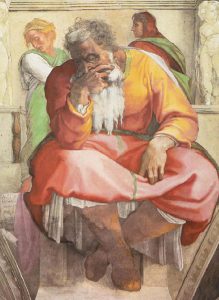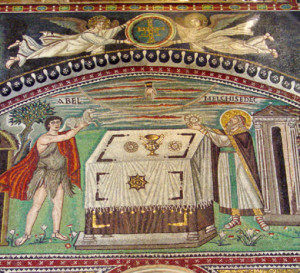Thoughts on Sunday’s Lessons for March 17, 2024 (Lent 5B)

The Prophet Jeremiah (1508-1512), fresco by Michelangelo Buonarroti (1475-1564). Sistine Chapel ceiling, Vatican City, Rome. (Click image to enlarge.)
First Reading: Jeremiah 31:31-34
The consistent pattern of our Lenten Lectionary readings continues as Palm Sunday and Holy Week draw near: In the Gospels we have followed Jesus and his disciples toward Jerusalem. Our Hebrew Bible readings have told of God’s covenants with the people. The first reading for the Fifth Sunday of Lent draws from the Prophet Jeremiah. The prophet laments that the chosen people have broken the covenant promise to walk in God’s ways that their ancestors made at Mount Sinai. Now Jeremiah tells of a new covenant that is to come. This one will be permanent, he says. It is not only written on stone tablets but directly on their hearts.
Psalm: Psalm 51:1-13
Legend tells us that King David himself wrote this psalm. In a powerful narrative, the prophet Nathan had confronted David after David sent his general, Uriah, to die in battle so he could take Uriah’s beautiful wife Bathsheba for himself. In poetic words that reflect covenantal ideas, the Psalmist pours out David’s shame and grief. He admits to wickedness, makes no excuses, but begs for God’s mercy and forgiveness to restore in him a clean heart. A heart on which God, perhaps, can write God’s covenant of love.
Alternate Psalm: Psalm 119:9-16
Psalm 119, the longest of all the Psalms, carries a message of covenant throughout its many verses: Those who follow God’s laws and teaching, modeling their lives on Torah so as to walk in God’s ways, will reap rewards. These verses, “With my lips will I recite all the judgments of your mouth,” seem to reflect God’s response in Jeremiah’s call to prophesy. When Jeremiah said, “Truly I do not know how to speak, for I am only a boy,” God answered, “you shall speak whatever I command you. … Now I have put my words in your mouth.”
Second Reading: Hebrews 5:5-10
The Letter to the Hebrews, scholars believe, was not addressed to a specific congregation. Rather, it was a broad appeal to formerly Jewish Christians who had returned to their original faith late in the first century to avoid the persecution falling on Christians by Rome. Its author argues that Jesus, as Christ, follows in the great tradition of Jewish high priests. That line goes back through millennia to Melchizedek, the ancient king and great high priest who had blessed Abram before God offered the first covenant to Abram and Sarai. As Jesus has become the source of eternal salvation who intercedes on our behalf forever, the unknown author writes, there is no longer any need for priestly sacrifice.
Gospel: John 12:20-33
It is not clear from John’s Gospel whether Jesus actually did consent to meet with the Greek visitors who told Philip that they wanted to see Jesus. John places them in this passage, perhaps, to emphasize that Jesus will draw in all people: Jew and Greek, men and women, slave and free; everyone. Now, as John’s narrative moves toward Jesus’s last Passover, his passion and death, Jesus has words for the world and the ages to hear: Just as Jesus must die to bear the fruit of salvation through his resurrection, we are the seeds of faith, called to grow in discipleship. Do we lie fallow and die, or do we grow and bloom where we are planted, bearing fruit as we follow and serve Christ?



